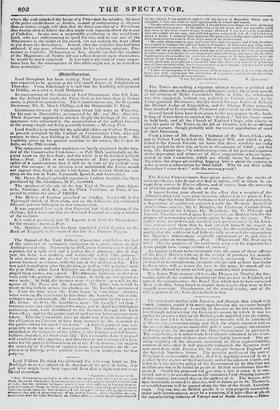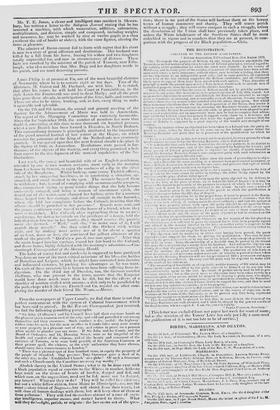The merehauts trading with Jamaisa, and through that island with
South America, regard with much apprehension the measures brought forward in the House of Assembly in Jamaica in the last session, but lost through not receiving the Governor's assent, by which it was ins tended to propose a duty on all British goods imported into the colony. They are now led to believe thet a similar measure will be introduced in the sins-ion jo,,t commencing, and that the object aimed at will on the severel ettempt prove successful, 'mhos some prompt interference shall take place on the part of the Home Government to prevent it. 'flue suffiject has, it is understood, been already submitted to the Colo- nial-office on the part of those more immediately interested. The pe- culiar impoliey of the measure, according to these representations, consists in this—that it will gradually extinguish the lucrative trade now carried on, with Jamaica for its entrepet between England and the SpanuiI, American States. The peculiar position of the port of Kingston is so favourable to this, that it is regularly resorted to as rs merket by the treders of this Continent, and of the adjacent islands, and it has been the uniisorm policy of the Government up to this time not to allow any tax to be levied on goods of British manufacture thus de- posited. Shotld the proposed bill :kiss into a law, it must, it Is con- ceived, not only he misehievous to the commercial and shipping interests of this country, but recoil also on the authors of it. The buyers, who have heretofore resorted to Jamaica, will in future go to St. Thomas's, or establishments will be opened along the line of the South American coast. Any tax, too, on British goods, it is very properly contended, under such circumstances, must be a premium, if it take effect at all, on the manufacturing industry of Europe and of 2+14,Arth America.—Traless Mr. T. E. Jones, a clever and intelligent man resident in Shrews- bury, has written a letter to the Salopiun Journal stating that he has invented a machine, with which numeration, addition, subtraction, multiplication, and division, simple and compound, including weights and measures, &c. may be worked by nine or twelve pupils in a class (without the aid of books or slates), with the same figures, altering the sums at pleasure. The admirer of Burns cannot fail to learn with regret that his sister is now in a state of great affliction and destitution. Her husband was killed by a fall from his horse, leaving his widow and two daughters totally unprovided for, and now in circumstances of distress These facts ate vouched by the minister of the parish of Tranent, near Edin- burgh, who also mentions that Mrs. Ilegg and her daughters reside in his parish, and are most deserving persons.



























 Previous page
Previous page